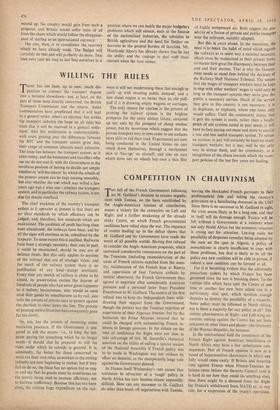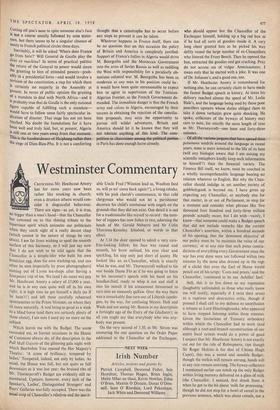COMPETITION IN CHAUVINISM
THE fall of the French Government following on M. Gaillard's decision to resume negotia- tions with Tunisia, on the basis established by the Anglo-American mission of conciliation, means a victory for the extremists on Left and Right; and a further weakening of the already shaky Centre, on which French governmental coalitions have relied since the war. The sequence of events leading up to the defeat shows that M. Gaillard and his Government have made the worst of all possible worlds. Having first refused to consider the Anglo-American proposals, which contained considerable concessions on the part of the Tunisians (including reconsideration of the cases of French citizens expelled from the coun- try, maintenance of the French base at Bizerta and supervision of four Tunisian airfields by neutral observers), the French Government then agreed to negotiate after considerable American pressure and a personal letter from President Eisenhower to MI Gaillard. The motive of the first refusal was to keep the Independents from with- drawing their support from the Government, though the pretext was the Tunisian rejection of supervision of their Algerian frontier, but by this hesitation the Prime Minister ensured that he could be charged with surrendering French in- terests to foreign pressure. In the debate on the vote of confidence the Right were not slow to take advantage of this. M. Soustelle's rhetorical question on the utility of calling a special session of the National Assembly if French policy was to be made in Washington was not without its effect on deputies, as the unexpectedly large vote against the Government showed.
In France itself Wednesday's vote means that resistance to advocates of a 'tough' policy in North Africa has now become almost impossibly difficult. How can any successor to M. Gaillard do other than break off negotiations with Tunisia, leaving the blockaded French garrisons to their problematical fate and taking his country's grievances to a humiliating dismissal in the UN? Since there is no successor to M. Gaillard in sight, the crisis seems likely to be a long one, and that in itself will do damage enough. 'France will be left without a Government at a moment when not only North Africa but the economic situation is crying out for attention. Leaving aside the possibility of desperate remedies being adopted by the men on the spot in Algeria, a policy of inunobilisme is clearly insufficient to cope with these problems, but that is likely to be all the policy any new coalition will be able to pursue, if indeed a new coalition can be formed at all.
For it is becoming evident that the admittedly precarious system by which France has been governed since the war is breaking down. To the various rifts which have split the Centre at one time or another has now been added one in a particularly vital spot, which involves enough deputies to destroy the possibility of a majority. Some policy must be followed in North Africa, but is there a majority for any policy at all? The sinister phenomenon of Right- and Left-wing ex- tremists uniting against the Centre has not been unknown in other times and places—the Germany of the Weimar Republic, for instance.
In the international field the resentment of the French Right against American interference in North Africa may have a few unfortunate con- sequences. Part of French opinion is now in a mood of hypersensitive chauvinism in which any folly would come easily. If Britain and America vote against France when Franco-Tunisian re- lations come before the Security Council (and it is hard to see how they could do anything else), then there might be a demand from the Right for France's withdrawal from NATO or, at any rate, for a suspension of the treaty's operation. Cutting off one's nose to spite someone else's face is not a course usually followed by sane states- men, but there seems to be a singular absence of sanity in French political circles these days.
Inevitably, it will be asked 'Where does France go from here?' Will General de Gaulle play the deus ex machina? In terms of practical politics the return of the General to power would mean the granting to him of extended powers—prob ably in a presidential form—and would involve a revision of the constitution, a step for which there Is certainly no majority in the Assembly at present. In terms of public opinion the granting of a mandate to deal with North Africa—and it. Is probably true that de Gaulle is the only national figure capable of fulfilling such a mandate— would have to follow some fairly spectacular in- dication of disaster. That stage has not yet been reached. No doubt the foundations for it have been well and truly laid, but, at present, Algeria is still one or two years away from that moment. This is the bombardment of Haiphong rather than the siege of Dien-Bien-Phu. It is not a comforting thought that a catastrophe has to occur before any steps to prevent it can be taken.
Whatever happens in France itself, there can be no question that on this occasion the policy of Britain and America is completely justified. Support of France's follies in Algeria would drive M. Bourguiba and the Moroccan Government into the arms of Soviet Russia as well as saddling the West with responsibility for a peculiarly ob- noxious colonial war. M. Bourguiba has been as moderate as any man in his position could be : it would have been quite unreasonable to expect him to agree to supervision of the Tunisian- Algerian frontier, as the French Government de- manded. The immediate danger is that the French army and colons in Algeria, encouraged by their success in obtaining the rejection of the concilia- tion proposals, may seize the opportunity to pursue still wilder adventures. Britain and America should let it be known that they will not tolerate anything of this kind., The com- petition• in chauvinism among the. political. parties. in Paris has done enough harm already.





























 Previous page
Previous page